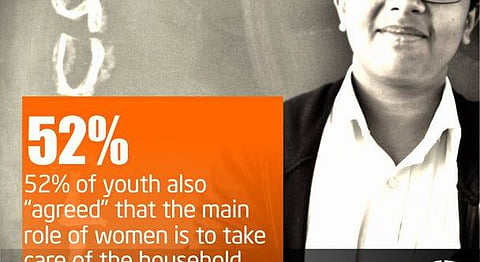
- HOMEGROWN WORLD
- #HGCREATORS
- #HGEXPLORE
- #HGVOICES
- #HGSHOP
- CAREERS
- ABOUT US
- CONTACT US

“The study shows the youth’s inability to understand democracy as a principle… undemocratic educational institutions and interactions continue to mark young people and encourage un-democratic ideas and attitudes.”
The findings unearthed from Yuva Nagarik Meter, a national survey, are not promising. Covering 757 social science teachers and more than 10, 000 students across 11 state capitals (including six metro cities and five non-metro cities), it is conducted by Mumbai-based Children’s Movement for Civic Awareness (CMCA), and several perturbing conclusions have been derived from the survey. Findings show that over 65% of those polled want a ban imposed on individuals of opposite sex belonging to different religions meeting in public places. The survey also indicated that more than half the country’s youth would prefer if India was under military rule, in the same vein as what a 2013 Hindustan Times youth survey also found.
“The idea behind conducting the survey – Yuva Nagarik Meter – was not only to find out whether the young Indians knew and understood what democracy truly meant and to also show how these youngsters were growing up and what values and attitudes they possessed pertaining to Rights & Responsibilities, Democratic Governance, Adherence to Civic Rules, Gender Equality, Diversity & Social Justice and Environmental Conservation etc. Furthermore, we also wanted to see the effect of formal education on youth and hence we chose two types of student groups – one from schools and the other from junior college,”
said Manjunath Sadashiva, director of CMCA.
With India all set to become the youngest country in the world by 2020, there is a heightened sense of significance to the results of the Yuva Nagarik Meter. Taking a look at the youth’s approach to the above mentioned parameters, the survey aims to shed light on their sense of civic responsibility.
Some of the other facts - ranging from appalling to absurd - the statistics brought to light include:
“Around 67% of college students said India should have only one strong political party at the Centre to rule the entire country and 53% students agreed that military should rule India for some years. Around 50% students across the country and 62% students in Mumbai showed intolerance towards migrant workers from other states. At the same time, 43% students said it was all right to violate rules because one could always get away by bribing official, while 38% said it was fine to violate rules because the penalty was small,”
When it came to diversity and social justice, students scored a feeble 23%, while gender equality saw a score of 10% - something that you’d think we’d be less shocked by considering the gender stereotypes that have been perpetrated by both genders for so long in the country.
“55% students in the age group of 15 to 19 agree that the way women dress and behave provokes men,” the survey said.
“Globally, gender equality and empowerment is one of the critical requirement for human development. The findings show that girls are equal participants against their own empowerment and emancipation,” Dr Manjunath Sadashiva said.
“The findings confirm our fears about the kind of education we are providing to our youth, or the informal political socialisation processes that are influencing them,” Dr. Sadashiva told HuffPost India. “We are so focused on creating economic actors through our education. Nobody is looking at the sole purpose of education i.e. to make them humane citizens.”
